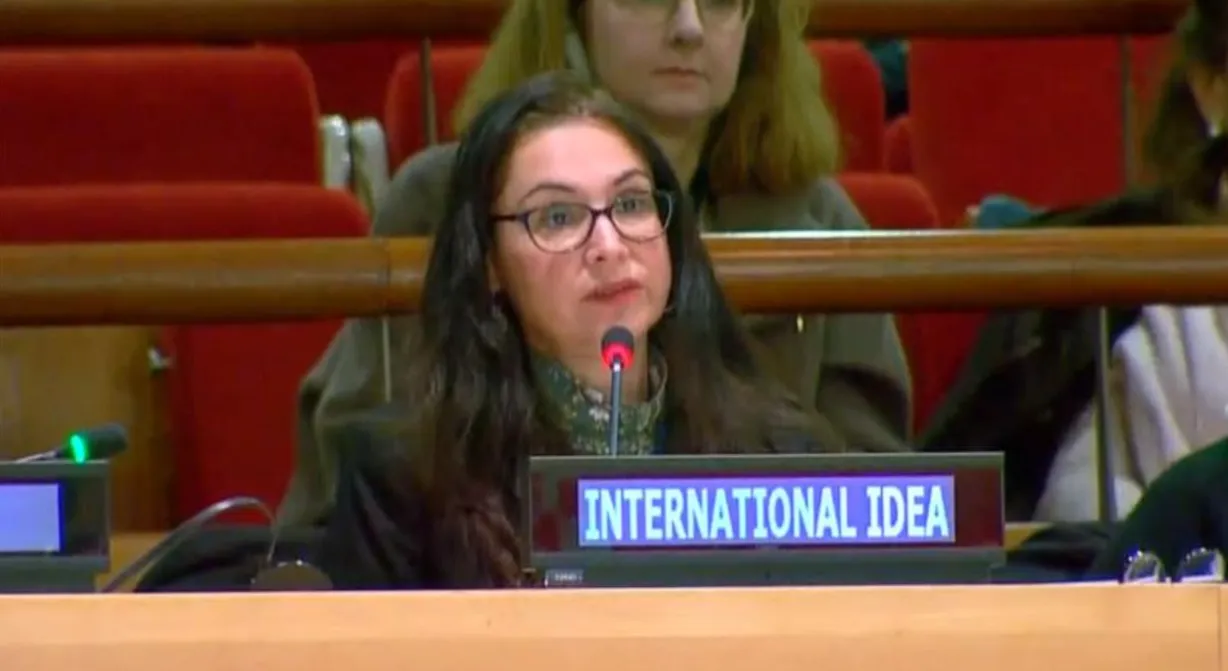International IDEA's Statement at the Second Informal Consultation of the SDG Summit Political Declaration

“SDG Summit”
Second Informal Consultation
16 March 2023, UN Headquarters New York
Statement by
Kevin Casas-Zamora
Secretary-General
International Institute for Democracy and Electoral Assistance (IDEA)
Excellencies,
International IDEA would like to thank the co-facilitators of Ireland and Qatar for convening this consultative process and welcomes the proposals put forward in the Elements Paper leading to a Political Declaration in the margins of the SDG Summit in September 2023. The SDG Summit, marking the mid-point of the 2030 Agenda, provides a unique global platform to catalyse development-enhancing changes in countries all over the world.
International IDEA believes that advancing democracy is a critical part of the changes that need to happen to achieve all SDGs. Democracy guarantees basic rights to citizens to have a continuous and active participation in their communities. Through free and fair elections, and the exercise of freedom of expression and association, people can debate and influence public decisions and policies. Without a voice in decision-making, it is far less likely that the needs of the people —from quality education (SDG 4) to climate action (SDG 13)—will be listened to and addressed by governments. Nor is it likely that without the voice of the people, expressed in elections and free public debates worthy of the name, decisions and policies that undermine those goals will ever be corrected.
This is not the only reason why democracy matters for the achievement of SDGs. We all know that the road towards the fulfilment of Agenda 2030 runs through gender equality, through the equal participation in all spheres of life of women and girls. International IDEA’s data and analyses have repeatedly shown that democracy achieves, by far, better results than any other political arrangement when it comes to gender equality. Saying that sustainable democracy is essential for sustainable development is not simply a normative assertion, but a dispassionate description of hard facts.
Even if, for whatever reason, the Member States of this body refuse to call that reality by its proper name, let us at least agree that the achievement of Agenda 2030 requires promoting peaceful and inclusive societies, providing access to justice for all, and building effective and accountable institutions, things all of them which democracy also does better than any other political system. Hence, semantics games aside, at the very least we must all agree that SDG 16 should be emphasised in the Political Declaration of the SDG Summit.
Measuring progress towards SDG 16 in as robust a way as possible is thus of the essence for this agenda. The SDG 16 Data Initiative, a consortium of 18 organizations seeking to support the open tracking of the global commitments made by more than 193 countries in 2015, provides complementary measures and analysis on several targets and indicators on SDG 16. The Initiative shows that the combination of official and non-official data contributes to deepening the analysis of these targets by means of indicators that fully measure the underlying concepts of access to justice, inclusive institutions, and the rule of law.
The SDG 16 Data Initiative is the embodiment of SDG 17. It is a visible example of the importance of forging durable global, regional, and national partnerships, including civil society, the private sector and academia, if we care about measuring progress towards realizing the Agenda 2030 and holding governments accountable. These partnerships equip governments with crucial data that may assist in the development of tangible solutions on the way forward. We hope that their importance will be explicitly recognized in the Political Declaration.
Today, the Agenda 2030 needs all the help and all the creative thinking it can get. The impact of COVID-19 and other current global shocks, including climate change and the war of aggression by Russia against Ukraine, paint a bleak picture and pose severe challenges for the achievement of SDGs. Through this Summit process, the global community has a distinctive opportunity to reassess established systems and propose innovative solutions to leave no one behind.
Next to nothing in this agenda –from tackling poverty to providing good healthcare, from improving education to advancing gender equality, from accelerating economic growth to reducing inequalities, from confronting the climate crisis to creating sustainable cities—will be achieved if SDG 16 fails. Therefore, we urge Member States to focus on the achievement of SDG 16 as an enabler for the attainment of all SDGs, and to consider it as a priority for debates in this Summit.
Thank you.